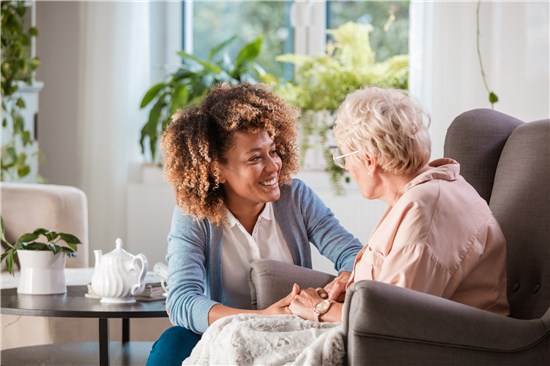Finding Care for My Loved One
One of the best ways to provide relief for a caregiver is to direct them towards resources for the person they care for.
_________________________________________
Within the Department of Human Services there are a number of unique programs that serve caregivers and care recipients.
Medicaid Managed Long Term Services and Supports (MLTSS)
Medicaid Managed Long Term Services and Supports (MLTSS) refers to the delivery of long-term services and supports through New Jersey Medicaid's NJ FamilyCare managed care program. MLTSS is designed to expand home and community-based services, promote community inclusion, and ensure quality and efficiency. Respite may be available to through your Managed Care Organization (MCO) as part of Medicaid, NJ Family Care (these include MLTSS and the Community Care waiver). 
Personal Assistance Service Program (PASP)
Personal Assistance Service Program (PASP) is a personal care assistance program that provides up to 40 hours per week of routine, non-medical personal care assistance to adults with permanent physical disabilities who are 18 years of age or older, who are employed, preparing for employment, attending school or involved in community volunteer work and who are able to self-direct their own services.
Statewide Respite Care Program
The Statewide Respite Care Program offers a periodic break for caregivers through a sliding scale payment model. More information can be found at the following link: New Jersey Respite Care Brochure (English) Statewide Respite Care Program Brochure (Spanish)
Jersey Assistance for Community Caregiving (JACC)
Jersey Assistance for Community Caregiving (JACC) offers a broad array of in-home and community-based services to individuals age 60 and older who meet clinical eligibility for nursing home level of care and who desire to remain in their homes within the community. More information can be found at the following link: JACC Brochure (English)
Alzheimer's Adult Day Services Program
The Alzheimer's Adult Day Services Program is another option for caregivers of individuals with dementia or related disorders who would like to send their loved one to an Adult Day Center.
Area Agencies on Aging
In each county, the Area Agency on Aging/Aging and Disability Resource Connection offers caregiver services through the Older Americans Act Title III E National Family Caregiver Support Program. More information can be found at the following link: ADRCNJ.org
Veterans
Services may also be available through Veterans Affairs for caregivers of veterans. This may be through the Program of Comprehensive Assistance for Family Caregivers (PCAFC) or through the Veteran’s Directed Care Program. More information can be found at the following links: VA Caregiver Support Program; Lyons Campus of the VA New Jersey Health Care System
The network of regional Veterans Service Offices (VSO), through the NJ Department of Military and Veterans Affairs (DMAVA) provides the state's Veterans and their dependents with information and guidance on employment, education, burial, counseling, housing, social and medical services and more. A list of local VSOs can be found at the following link: County Veterans Service Offices
PerformCare NJ (Children's System of Care)
The Children's System of Care (CSOC) serves children and adolescents with emotional and behavioral health care challenges and their families; children with developmental and intellectual disabilities and their families; and children with substance use challenges and their families in order to provide services based on the needs of the child and family in a family-centered, community-based environment.
Department of Human Services
Within the New Jersey Department of Human Services, there are multiple divisions that have programs that assist caregivers directly and through services to care recipients based on their categorical needs.
- Commission for the Blind & Visually Impaired (CBVI) promotes and provides services in the areas of education, employment, independent living and eye health through informed choice and partnership with persons who are blind or visually impaired, their families and the community.
- Division of Aging Services (DoAS) administers a number of federal and state-funded programs that make it easier for older adults to live in the community as long as possible with independence, dignity and choice.
- Division of the Deaf & Hard of Hearing (DDHH) provides education, advocacy and direct services to eliminate barriers and promote increased accessibility to programs, services, and information routinely available to the state’s general population.
- Division of Developmental Disabilities (DDD) assures the opportunity for individuals with developmental disabilities to receive quality services and supports, participate meaningfully in their communities and exercise their right to make choices.
- Division of Disability Services (DDS) provides a single point-of-entry for people seeking disability related information in New Jersey. DDS serves individuals with all disabilities, statewide. DDS works to streamline access to services and information that promote and enhance independent living for individuals with disabilities by facilitating coordination and cooperation among local, county and state government agencies.
- Division of Family Development (DFD) provides leadership and supervision to the public and non-profit agencies that deliver financial assistance and critical safety net services to individuals and families in New Jersey.
- Division of Mental Health and Addiction Services (DMHAS) oversees New Jersey's adult system of community-based behavioral health services. These agencies provide a full array of services, including substance abuse prevention and early intervention, emergency screening, outpatient and intensive outpatient mental health and addictions services, partial care and partial hospitalization, case management, medication assisted treatment for substance abuse, and long and short term mental health and substance abuse residential services, in addition to other evidence-based practices such as the Program for Assertive Community Treatment (PACT), supported employment and education, and supportive housing.
- Division of Medical Assistance & Health Services (DMAHS) administers Medicaid’s state-and federally- funded NJ FamilyCare programs for certain groups of low- to moderate- income adults and children. Through these programs, DMAHS serves approximately 1.7 million, almost 20% of New Jersey’s residents.